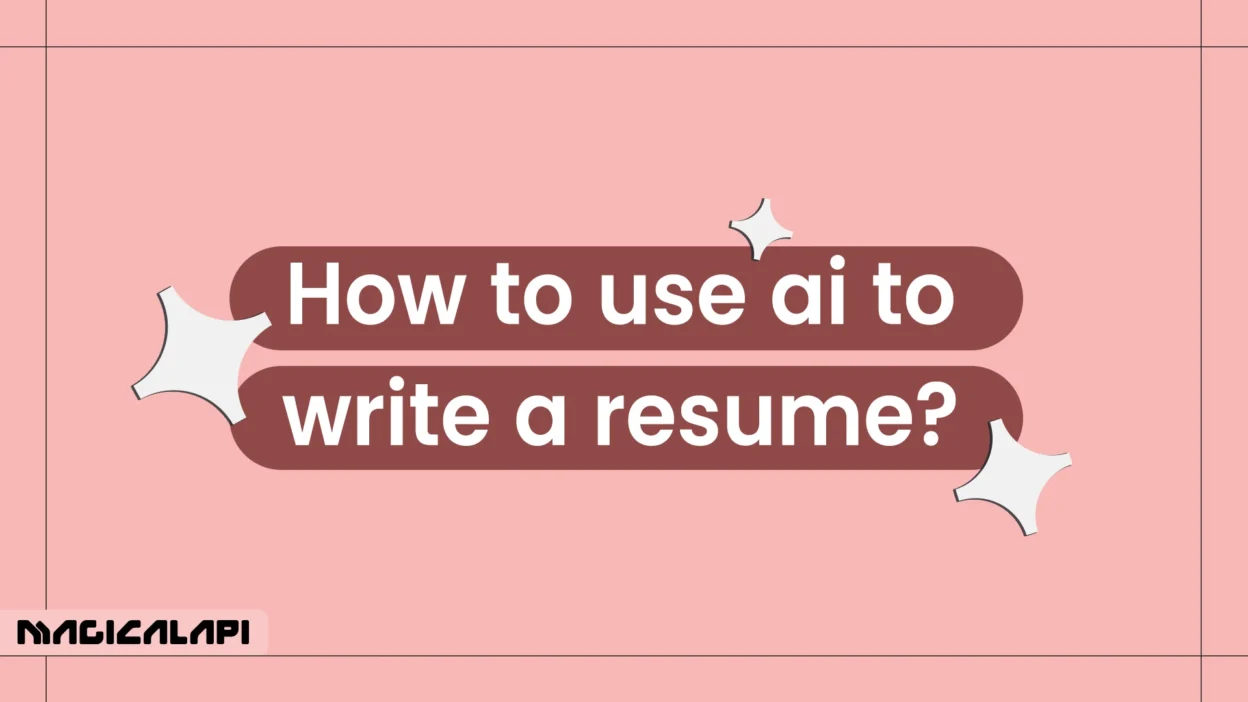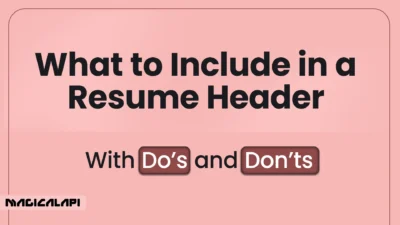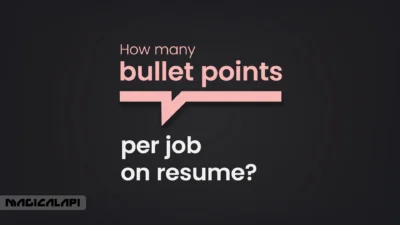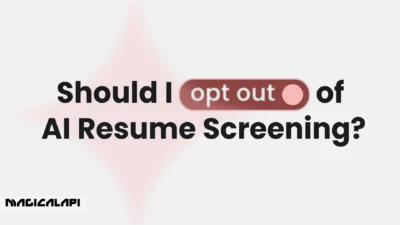Job searching is always changing, and in 2025, artificial intelligence (AI) will play an established and revolutionary role in career planning and development. Suppose you have ever been filled with dread while staring at a blank page, trying to fit your entire professional life into a one-dimensional and compelling document.
In that case, you are not the only one feeling anxious. Learning “how to use AI to write a resume” is a complete game-changer. This comprehensive guide will give you everything you need to know about using AI to create a resume that will impress both recruiters and the emerging software used to screen applicants.
That’s exactly where AI transforms the process. Learning how to use AI to write a resume removes unnecessary stress and replaces it with strategy. It helps you focus on your achievements instead of struggling with formatting, word choice, and layout. AI tools can analyse job descriptions, highlight relevant keywords, quantify accomplishments, and even tailor your resume to pass Applicant Tracking Systems (ATS), the software recruiters use to filter candidates.
This comprehensive guide will walk you through everything you need to know about using AI effectively when building a resume. You’ll learn how to use AI to showcase your value, impress real recruiters, and meet the requirements of the smart software used to screen applicants. With the right approach, AI doesn’t replace your experience; it amplifies it.
Table of Contents
Why Use AI to Write Your Resume in 2025?
If you feel that using a machine to develop your career story is a little impersonal, I understand. Nevertheless, AI-powered resume builders are a huge competitive advantage in a saturated job market. Here are some reasons to think about using them:
- Efficiency and Speed: One of the biggest benefits of AI is the speed you can create a high-quality, structured resume. Instead of labouring over formatting and phrasing your resume and spending hours, if not days, agonising about it, an AI tool can generate a decent draft in minutes. That all-important precious time can be spent on more important parts of your job search, such as networking and prepping for interviews.
- Getting past writer’s block: Writer’s block is so annoying, not just for writers. It happens at the worst times. AI can be your co-writer, adding valuable professionally written bullet points, summaries, and skills to your experience and target role. This jumpstart is very useful for organising your ideas and getting the words flowing.
Read More: Which AI Is Best for Resume Writing?
- Keyword Optimisation for ATS and use ai to write a resume: Many organisations, especially large corporations, use ATS to deal with a high volume of applications. ATS scanning for keywords from the job description found on resumes and cover letters is a common step in the hiring process. AI resume builders are built to easily identify these keywords and phrases and incorporate them organically, which greatly increases your chance of successfully getting past this earliest screening. A good Resume Score nearly always comes down to this and other keyword optimisation.
- Professional Formatting and Design, and use AI to write a resume: A resume that is modern, visually attractive and professionally formatted will make a strong first impression to any potential employer. With AI software, you have access to modern templates that are visually attractive, professionally formatted, pencil and ink, industry recognized, and that are readable for ATS and human scanning and formatting.
Read More: How to Tailor Resume to Job Description AI?
What Information Should You Input into an AI Resume Writer?
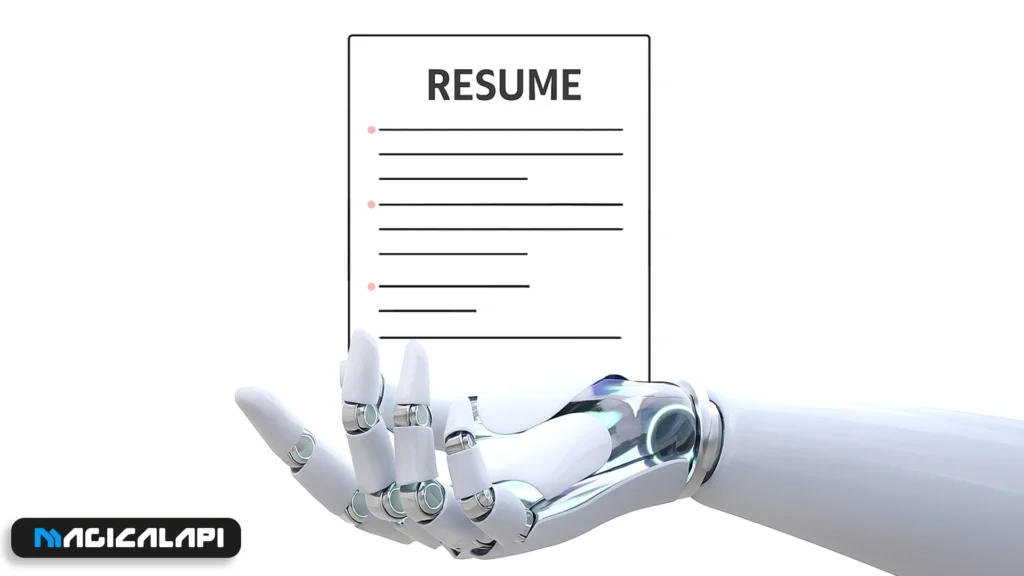
The quality of the resume produced by an AI tool all depends on the quality of the information you enter. So, before you start, make sure you have the following information prepared:
- Personal and Contact Info: This is your most important information to allow the recruiter to identify you and identify how to contact you by including your full name, phone number, and email address, and your location (usually city and state is sufficient). You can also provide a link to your LinkedIn Profile or a professional portfolio.
- Work History and use ai to write a resume: You will need, for the previous roles of your work experience, the name of the company, your position/title, and the dates you were employed. Do not simply regurgitate responsibilities, but highlight your accomplishments. It is a good idea to quantify accomplishments wherever possible. For example, instead of writing, “Managed the social media accounts,” you could write, “Achieved 30% increase in engagements on social media accounts over six months.”
- Education: Provide the name of the educational institution, the degree, and graduation date. You can also include any honors, awards, or relevant coursework.
- Skills and use ai to write a resume: Compile an exhaustive list of all your hard and soft skills. Hard skills refer to tangible, teachable abilities, such as programming languages, data analysis, or graphic design. Soft skills refer to interpersonal skills, including communication, teamwork, and problem-solving. AI tools can also provide possible hard and soft skills, depending on your work history and the job you are applying for.
- Job Description: This is an important piece of information for you to provide. If you place the job description for the job you want into the AI tool, then it can more efficiently produce the language, keywords, and focus of your resume. The finished product can relate to what the employer is looking for.
Read More: How many bullet points per job on resume?
Step-by-Step Guide: Creating a Resume with AI Tools
Now that you know what information to gather, let’s find out how to create a resume with AI. The process is generally straightforward and user-friendly.
- Pick an AI Resume Builder: The first thing you’ll need to do is choose an AI resume builder that meets your needs. There are a variety of tools on the market with different features and pricing options.
- Select a Template: Once you’ve chosen a tool, you will generally be taken through a process of selection for a resume template. Choosing a template can be challenging and will depend on your industry and your personal brand. Creative types may wish to choose a template that is more dynamic visually, while someone looking for a corporate position may want to stick with a more traditional version.
- Input Your Information: This is where you’ll make an account and enter all of the information that we talked about in the previous section. Most of the AI resume builders will have an intuitive interface that will guide you through each section of the resume, from contact information through to your skills.
- Use the AI-Powered Suggestions: As you complete each section, the AI will offer suggestions to help improve the content. It may suggest a more powerful way to say your achievement, it may suggest skills you forgot you have, and it may help you create a powerful professional summary.
- Customize for a Job and use ai to write a resume: Upload the job description for the position to which you are applying. The AI then analyzes that and suggests keywords and phrases to add to your resume, making it as tailored and specific as possible.
- Review and edit: The use ai to write a resume will create an entire resume for you, so be sure to review it carefully and edit it yourself. You need to read through the resume and make sure it’s correct, it doesn’t read awkwardly, and some sections may not be your voice.
Read More: Marketing Resume Giude
How to Customize an AI-Generated Resume for Each Job
While artificial intelligence (AI) can do a lot of the initial heavy lifting for you, having a boilerplate document is a great way to get yourself rejected from a potential job. Here’s how to take the AI draft and modify it for each employer:
- Adjust the Professional Summary: The professional summary, if your resume has one, should grow and diminish as it introduces your credentials into a tailored introduction that is focused for the role. Change the language or emphasis when you’re discussing your skills and experiences to highlight the areas that correspond most closely to the job you’re applying for.
- Coordinate Your Bullet Points: Look at all the bullet points you’ve written in your work experience. Change the order of the accomplishments to prioritize those most closely related to the new role. You can also fudge the wording a little to match the wording cited in the job description.
- Adjust Your Skills Section: While your most meaningful skills will still be the same, you can change, add, or emphasize which skills are called out in the job posting. Focusing on the skills in the job advertisement show the employer that you’ve taken time to understand what they need.
- Use Specific Keywords: Even with the help of use ai to write a resume it is advisable to check the job description one more time manually to make sure that when it’s appropriate you have incorporated the most important keywords into your resume naturally. You can use our Magicalapi Resume checker in conjunction with this step to ensure you didn’t miss anything.
Magical Resume Checker
Discover the full potential of the Magical Resume Checker and explore the various options available to enhance your resume, optimize it for applicant tracking systems (ATS), and improve your chances of landing your dream job.
Best AI Resume Builders to Try Today
The AI resume builder industry is booming. Here are a few of the best options available on the market for use ai to write a resume in 2025:
- Kickresume: Kickresume generally earns high scores for quality and interface. It has ATS-friendly templates, an AI resume and cover letter writer, and an easy-to-use resume checker.
- Resume Genius: If you are short on time, Resume Genius is one of the best options. They offer one-click content suggestions, and can stand by to have a resume generated in a matter of minutes.
- Zety: Zety is a great option for a novice resume writer to get started. The site offers a step-by-step builder and pre-written options to help through the process.
- Novoresume: Novoresume is known for its streamlined and sophisticated templates. If you work in a more conservative industry or field, and want a modern touch, Novoresume is an excellent option.
- Enhancv: If you work in a creative field, Enhancv offers many templates that catch the eye and can be customized to add additional flavour and personality to your resume.
The Human Touch: Why Final Editing is Crucial
AI tools can be a powerful and efficient way to create your resume, but they are not perfect. The last step in use ai to write a resume process is a human review, and here’s why this is essential:
- Assuring Authenticity: AI often generates text on the generic and robotic side of things. This is your chance to complete the edit by putting your voice and personality into the document. You want to make sure it is a true reflection of you as a professional.
- Fact-Checking and Accuracy: AI can make mistakes or get things confused based on what you have provided. Be sure to fact-check dates, company names, job titles, and your accomplishments to make sure everything is 100% accurate.
- Context and Nuance: No one knows you better than you. I guarantee that you know secrets about your career journey that no algorithm knows. You could provide context and nuance to your experiences that AI won’t feature, to complete your story more compellingly and fully.
- Proofreading for Polishing: Typos and grammatical mistakes are death knells for recruiters. They will forgive some stylistic mistakes, but things like typos can send them the wrong signals. While most AI tools have some type of grammar checker, you don’t want to depend on these completely. With new eyes, say your resume out loud or have a trusted friend or mentor read it over and look for any errors or mistakes that may still be in your resume.
Can AI Pass Applicant Tracking Systems (ATS)?
One of the main reasons that job seekers are turning to AI for help is to overcome the problem of Applicant Tracking Systems. So, can AI-written resumes pass the ATS? Yes, but only if you use proper tools.
There are AI resume builders that have been made with ATS in mind. They know the complexities of What is Resume Parsing? This is the process that the ATS uses to extract and analyze your information from your resume. This tool offers good ATS designed formatting, structured headings, and provides keyword optimization so you have a fighting chance of having a readable resume.
Still, you want to avoid complicated designs, graphics and overselling yourself with eclectic fonts that an ATS may not be able to read. It’s usually safe to rely on reputable AI resume builders to stick to templated designs.
Beyond the Resume: AI in Your Broader Job Search
The role of AI for your job search is not limited to writing your resume. Here are some additional ways to utilize this technology for your benefit:
- Cover letter writing: Most AI resume builders also have AI-powered cover letter generators. These generators can help you compose heartfelt and impactful cover letters to send along with your resumes.
- LinkedIn pro-activity: AI can review your LinkedIn profile and suggest ways to improve your headline, summary, and experience sections to increase your attractiveness and comfort level for recruiters.
- Mock interview preparation: Some AI collaborative platforms will conduct simulated job interviews and provide constructive feedback on your answers, body language, and interpersonal communication style.
- Job location matching: Some platforms leverage AI to match you with job domains based on previously demonstrated skills and experiences saving you time while considering roles.
Ethical Considerations When Using AI for Your Resume
Like all powerful technologies, you should pay attention to the ethical implications when using AI in your job search.
- Honesty and Accuracy: Never use AI to exaggerate or fabricate your experience. The information in your resume should always be honest and accurate.
- Plagiarism: While AI can provide a suggestion, you should think twice before copying and pasting a generic, pre-written resume content without changing anything to fit your experiences. Your resume should be a reflection of you and should never read off like a list of clichés.
- Transparency: Expect to speak to every point on your resume in your interview. If you’ve used AI to help you articulate your accomplishments, make sure you’re able to elaborately and authentically speak about those accomplishments.
The Future of AI in Career Development: Your Lifelong Career Co-Pilot
The role of AI in your professional career will expand well beyond improving your resume. We are moving into an era where artificial intelligence will serve as a permanent career co-pilot, personalized to you, as part of the lifecycles of your career. The changes will be profound, including increasing equity in access to strategic career advice typically reserved for senior executives. There will no longer be one-off touchpoints; we will be engaging with AI continuously to develop our careers and adapt to change while maximizing the potential of our careers.
Here is a deeper look at exciting, broader trends than we see on the horizon:
Hyper-Personalized Career Pathing
Shortly, AI will evolve past simply job matching as a career architect. Imagine an AI that takes into account your professional goal aspirations, work-life balance preferences, personality, based on assessments, and real-time labour market conditions, in addition to just looking at your resume.
This AI-powered career navigator will:
- Create Dynamic Roadmaps: Rather than designing a static ladder, the AI will give you any number of potential career paths. It may give you a path for rapid advancement, a path for work-life balance, and a path for transitioning into an emerging field. Each path will consist of 1) detailed milestones, 2) possible roles, and 3) a typical time frame.
- Identify Bridge Opportunities: For those making a major pivot away from a current career, the AI will have great capability to identify “bridge” roles that draw upon existing transferable skills and identify jobs that can serve as intermediate steps between where one is now, and where one wants to be, that feel less scary and stressful, and ultimately, more manageable and strategic.
- Predict Future Roles: By analyzing historical data as it pertains to shifts in the labour market and emerging technologies, these systems will have the capability to identify future job roles that do not even exist today, so that you can get a jump start on careers that have yet to be.
Proactive Skill Gap Analysis and Intelligent Upskilling
Staying relevant in an evolving job landscape is a foremost worry for today’s professionals. AI will help us ensure the efficiencies of learning and development can be continuous.
- Continuous Skills Assessment and use ai to write a resume: The AI will continuously monitor (with your approval) your professional activities and also analyze data from your performance reviews and completed projects to keep a continually updated inventory of your skills.
- Prescriptive Learning Pathways: Let’s say the AI identifies a gap between your current skill set and what will be needed for your next desired position. The AI will not simply identify that gap, it will prescribe a personalized “learning playlist” with online courses, certifications, articles, or connections within your organization, to teach you that skill. This takes all the guesswork out of professional development.
- Micro-learning & Just-in-time Learning and use ai to write a resume: AI will serve you mini-modules of learning in the workflow of your workday. If you were about to begin a project using a new software tool, the AI might ‘serve you’ a new 5-mintue video tutorial just before you begin, because it knows you’ll need that learning, and also knows, the best time for you to be learning it.
Magical Resume Score
Discover everything you need to know about Magical Resume Score , how it evaluates your resume, and the various options available to enhance your job application and improve your chances of success.
Democratizing Career Coaching and Interview Preparation
Traditionally, quality career coaching and interview preparation has been a high-cost and specialized service. While it is a career development luxury, AI is poised to take that expertise and make it available for everyone, all day, every day.
- AI-Powered Mock Interviews: There are already high-tech platforms capable of simulating job interviews. These AI platforms will become only more capable and intelligent, where they will not be only based on the content of your responses but will also be able to assess your tone of voice, pacing, filler words, and will even assess your non-verbal communication through the use of your webcam. The AI will offer immediate and focused feedback on your performance.
- Salary Negotiation Simulators: Perhaps the most uncomfortable part of the job search process is salary negotiation. New AI tools will arise that simulate this dialogue. The AI will be the hiring manager and will have access to salary data for actual roles in your job location. The AI will provide you a practice opportunity that can help you develop the confidence and negotiation skills to ask to be compensated appropriately.
- Your Personal Branding Agent: AI will serve as your personal publicist, allowing you to suggest ways to improve your LinkedIn profile, providing suggestions regarding what to post to continue to grow your personal brand, and identifying influential contacts to connect with in your field, who could become part of your powerful professional network.
Enhancing Internal Mobility and Employee Growth
Organizations are now coming to the conclusion that it is easier to retain and develop the existing workforce by leveraging internal mobility than it will be to replace and rebuild an entire workforce. Using AI for Resume will serve as the engine that fuels internal mobility.
- Internal Opportunity Marketplaces: Companies will employ AI-enabled systems to create an internal job board (on steroids). This Talent Marketplace will match employees ahead of time to open roles, projects or mentorship opportunities that may align with their skills and career intentions. This matching will even occur prior to the positions being publicly advertised.
- Mitigating Promotion Bias: By relying solely on data driven metrics of performance and skill (potential), AI systems can help to eradicate some of the unconscious bias that exist in promotion decisions and create equal opportunity for career mobility for all employees.
The advance of AI will not replace human ambition or human intuition in career development. Instead, it will augment both. With the tools mentioned above, you will be able to move along a continuum from a reactive career exploration strategy to a proactive career strategy designed with data and a personalized strategy to support your sustainable career advancement in a dynamic future of work zero.
Common Mistakes to Avoid When Using AI for Resumes
AI can be a great resource, but there are a couple of areas to avoid:
- Over-reliance on the AI: Do not consider the AI-generated resume as the final version. You should always review, edit, and personalize the resume.
- Not using the Job Description: The most effective resumes will be highly targeted. Not providing the AI a the job description means that the resume will inherently be generic and lack the specificity necessary to stand out.
- Choosing the wrong Template: The layout of your resume is important to the visual appearance. Use a template that fits both your industry and the company you are applying to.
- Not proofreading: As previously mentioned, typos and grammar can be very costly; with that being said, you should do a final proofread.
Conclusion: How do you use ai to write a resume?
Learning “how to use AI to write a resume?” has shifted from being a totally new concept to being a smart choice for job seekers in 2025. The speed, efficiency, and optimization and AI enable you to mix some unique experiences of your own with a personal ending to create a unique resume that can help you capitalize on exciting new opportunities.
Keep in mind that a resume is more than just a piece of paper; it is a marketing document for your career! If you want a baseline understanding, you may want to check out, What is a Resume? in depth, here.
Don’t forget to write for us in the comment section: How do you use ai to write a resume?
Common Questions For Use ai to Write a Resume
1. Is using AI to write my resume cheating?
Definitely not. Think of AI as you would a writing assistant. It helps you think through your content, provides some language suggestions to help quantify your ideas, and gives your resume layout a polished, professional format. You are still supplying the core content and remain ethically responsible to confirm that the final product is accurate and represents your ideas.
2. Can recruiters tell if a resume is AI-generated?
If you cut and paste the AI content without any consideration for personalization, a savvy recruiter might see through the “tone” of the documents you create as being generic. This is the main reason I encourage spending the time to edit and personalize the output document as every resume should have an individual voice represented in it, and should include specific, quantified achievements that the candidate has accomplished.
3. Are AI resumes free?
AI resume generators may have free options with features and limitations. If this only includes access to free features, that can be stellar as a starting point. But as with any business model, in order to receive the feature that include premium templates, deeper analysis and unlimited downloads, you will most likely need to subscribe to a paid plan.
4. How do I choose the right AI resume builder?
The “best” AI resume builder ultimately comes down to your own preferences and needs. Things to consider: usability, template design, features, and budget. Check reviews and try the free versions of a few tools to find the right fit.
5. Can AI write my entire resume for me?
AI can create the structure, wording, and formatting, but you still need to provide accurate information about your experience, skills, and achievements. AI works best when you guide it.
How much information should I provide to the AI?
Provide:
Work history (job titles, companies, dates)
Skills and certifications
Education
Achievements or measurable results
More details = a stronger, more customized resume.


